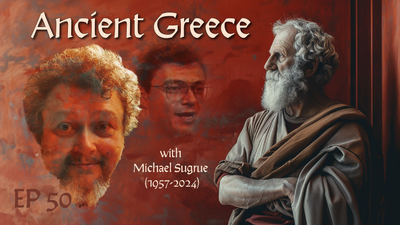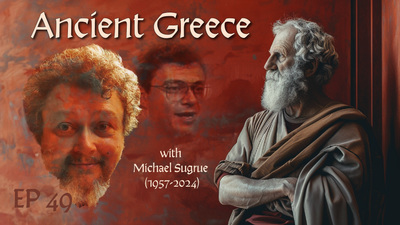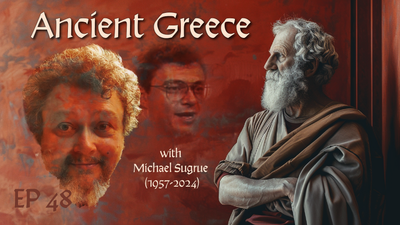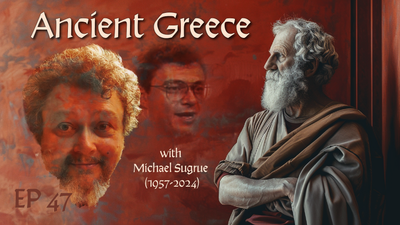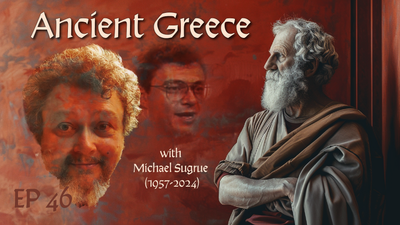What does it mean to truly love, and how can this love lead us toward something eternal? In Plato’s Symposium, love is not just an emotion or desire but a transformative force guiding us from admiration of physical beauty to the contemplation of eternal truths. The symposium setting, with its celebrated guests—Socrates, Aristophanes, Agathon, and others—each sharing their views on love, illustrates that love is complex, multi-faceted, and ultimately a path to immortality. As we journey through their speeches, we witness love’s capacity to bridge the physical and metaphysical, uniting the human experience with the divine.
Each speaker brings a unique perspective, but it is Socrates’ recounting of Diotima’s “ladder of love” that encapsulates love’s highest purpose. In her view, love begins with physical attraction but, with courage and reflection, it ascends to the love of wisdom and truth itself. This week, as we unravel these layers of love, consider how Diotima’s ladder might apply to modern life and relationships. Can love today still inspire us toward lasting values, grounding us in what is timeless?
From the Archives of Ancient Greece: Featuring Dr. Michael Sugrue
Dr. Sugrue’s reflections on Symposium bring out the depth and paradoxes of each speech, with particular focus on Diotima’s perspective, which he describes as both mystical and logical. Sugrue explores how Diotima sees love as a ladder, beginning with physical beauty and ending in a contemplation of the Form of Beauty itself—a kind of divine revelation. For example, Sugrue notes that just as an artist may be moved to create by a glimpse of beauty, a lover, too, is drawn upward from the allure of the individual to the universal. The lover’s ascent is a journey, beginning with tangible affection and advancing toward philosophical wonder.
Dr. Sugrue also discusses how, in loving particular qualities or people, we glimpse an eternal ideal that transcends individual forms, echoing Plato’s theory of Forms. Diotima’s guidance is a reminder that love for another can inspire us to reach for truth and knowledge that goes beyond the immediate or personal. By joining the discussion on planksip.org, readers can engage with others in exploring these ideas, imagining what it might mean to pursue love in its highest form as Diotima describes.
Insights from the Dialogues: Quoting Plato
In the Symposium, Diotima describes love as a “ladder” ascending from the appreciation of one beautiful body to all physical beauty, and ultimately to the love of Beauty itself (Symposium, 210a-212a). Her ladder of love guides Socrates to understand love’s potential to transcend personal desire. Each rung on this ladder represents a deeper form of admiration, suggesting that true love isn’t fixated on the physical alone but seeks wisdom and an immortal understanding of Beauty itself.
For instance, Diotima’s insight that love for an individual leads to a broader love for humanity hints at the way we often find common ground and empathy when in love. When we deeply love, we are more open, more receptive to the potential in others, and drawn to wisdom. This is how love propels us toward what is enduring and universal. To see this ladder in action today, consider how many relationships—friendships, family bonds, romantic connections—inspire us to grow, seek truth, and be better. This understanding of love as an elevating force can be further explored with others on planksip.org, where readers can share their own reflections on the pathways love has opened for them.
Chance and Fate: Exploring Ancient Games
In ancient Greece, games like knucklebones (astragali) were played not only for amusement but often to communicate with fate, serving as metaphors for life’s unpredictability. In love, as in games of chance, we encounter unpredictability; yet, love also demands a willingness to rise above life’s randomness. The Greeks believed in Tyche (luck or fortune), and their games often symbolized the mysterious, uncontrollable forces at play in human destiny, especially in matters of love and desire.
Explore the Mystical World of Astraguli: Ancient Games of Chance with Cultural Significance.
Imagine a game of astragali played at an ancient symposium, perhaps as a playful gamble among friends. The results could change suddenly, just as love can surprise us and alter the course of our lives. Yet, through the guidance of wisdom—akin to moving up Diotima’s ladder—we can turn these seemingly random encounters into opportunities for growth and understanding. In this sense, love and fate are intertwined, as we respond to life’s surprises with grace and insight. By joining discussions on planksip.org, readers can delve into how the ancients perceived love’s role in guiding us beyond fate and chance, transcending the everyday to reach the universal.
Virtues Revisited: Practical Lessons for Today
This week, the virtue of Courage shines through Diotima’s vision of love. To ascend her ladder of love requires courage—not only the bravery to love deeply but to transcend personal desires and reach for something greater. In today’s world, where love is often idealized as mere passion or comfort, the courage to see love as a path to personal and philosophical growth is rare but transformative.
Consider how embracing this form of love might encourage us to think beyond ourselves, asking questions about how our love impacts others and how it can serve a higher purpose. This form of courage takes love to new dimensions, encouraging us to pursue growth, truth, and wisdom. As readers reflect on these ideas, they are invited to share on planksip.org how love has inspired courage in their own lives or in the lives of others, deepening our collective understanding of love’s potential.
Engage with Us: Reader’s Corner
We invite you to reflect on what love means to you in light of Diotima’s ladder. Have you experienced love as a transformative force in your life, leading you toward wisdom or greater purpose? Do you believe love can be a path to something eternal, as Plato suggests? Join the conversation on planksip.org, where our community is exploring love, courage, and the pursuit of wisdom in the modern world. Selected reflections will be featured in upcoming issues, allowing your thoughts to inspire others.
Closing Reflection: Socrates’ Enduring Legacy
Socrates’ dialogue with Diotima in the Symposium offers a timeless view of love’s power to transform and elevate. Their exchange encourages us to consider love not only as a personal bond but as a pathway to understanding the eternal and the divine. In a world where love can feel fleeting or trivialized, Diotima’s wisdom reminds us that love is more than an emotion; it is a ladder leading us toward Beauty and truth. On planksip.org, we continue to honor Socrates’ legacy by imagining a world where love is a guiding principle in the pursuit of wisdom and the Good.

Plato Re-Imagined
This course offers 32 comprehensive lectures exploring most of Plato's dialogues. These lectures guide students toward a consilient understanding of the divine—a concept that harmonizes knowledge across disciplines and resonates with secular and religious leaders. As a bonus, Lecture #33 focuses on consilience, demonstrating how different fields of knowledge can converge to form a unified understanding.


